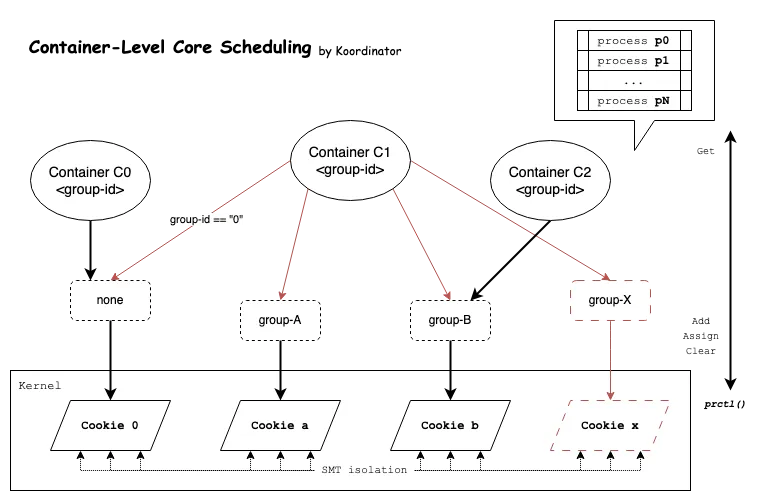By Rougang Han and Jianyu Wang
Koordinator is an open source project, born from the accumulated experience of the container scheduling industry in Alibaba for more than two years. It has been iterating continuously to provide comprehensive solutions for workload consolidation, co-located resource scheduling, mixed resource isolation and mixed performance tuning. It aims to help users optimize container performance and improve the efficiency of cluster resource usage and management and optimization of latency-sensitive workloads and batch jobs.
Besides, Koordinator has been accepted by the CNCF TOC members as a Sandbox project. CNCF (Cloud Native Computing Foundation) is an independent, non-profit organization that supports and promotes cloud native software like Kubernetes, Prometheus, and etc.

koordinator-aboard-cncf-sandbox-img Vote address: https://github.com/cncf/sandbox/issues/51
In the past version of v1.4.0, Koordinator supports users to set different NUMA alignment policies for different nodes in the cluster. However, this means that users need to pre-split the nodes into different node pools with different NUMA alignment policies, which cause additional overhead of the node operations.
In v1.5.0, Koordinator introduces Pod-level NUMA alignment policies to solve this problem. For example, we can set SingleNUMANode for pod-1:
apiVersion: v1
kind: Pod
metadata:
name: pod-1
annotations:
scheduling.koordinator.sh/numa-topology-spec: |-
{
"numaTopologyPolicy": "SingleNUMANode",
}
spec:
containers:
- name: container-1
resources:
requests:
cpu: '1'
limits:
cpu: '1'After introducing Pod-level NUMA policies, it is possible that there are multiple NUMA policies on the same node. For example, node-1 has two NUMA nodes, pod-1 uses SingleNUMANode policy on numa-0, and pod-2 uses Restricted policy on numa-0 and numa-1.
Since setting the resource requirements for the Pods can only limit the maximum resources they can use on the machines, it cannot limit the resources they can use on a NUMA node. So pod-2 may use more resources than the resources allocated on numa-0. This leads to resource contention between pod-2 and pod-1 on numa-0.
To solve this problem, Koordinator supports configuring the exclusive policy for Pods with SingleNUMANode policy. For example, we can configure pod-1 to use SingleNUMANode policy and not co-exist with other Pods on the same machine:
apiVersion: v1
kind: Pod
metadata:
name: pod-1
annotations:
scheduling.koordinator.sh/numa-topology-spec: |-
{
"numaTopologyPolicy": "SingleNUMANode",
"singleNUMANodeExclusive": "Required", # Required or Preferred
}
spec:
containers:
- name: container-1
resources:
requests:
cpu: '1'
limits:
cpu: '1'Moreover, the introduction of Pod-level NUMA policies does not mean that the Node-level NUMA policies will be deprecated. Instead, they are compatible. If the Pod and Node-level NUMA policies are different, the Pod will not be scheduled to the node; if the Node-level NUMA policy is "", it means that the node can place any Pod; if the Pod-level NUMA policy is "", it means that the Pod can be scheduled to any node.
| SingleNUMANode node | Restricted node | BestEffort node | |
|---|---|---|---|
| SingleNUMANode pod | [✓] | [x] | [x] |
| Restricted pod | [x] | [✓] | [x] |
| BestEffort pod | [x] | [x] | [✓] |
| "" | [✓] | [✓] | [✓] |
For more information about Pod-level NUMA policies, please see Proposal: Pod-level NUMA Policy.
In v1.5.0, Koordinator cooperates with the Terway community to build the Network QoS.
Terway QoS is born to solve the network bandwidth contention problem in workload consolidation and co-location scenarios. It supports limiting the bandwidth of Pods or QoS classes, which is different from other solutions:
It supports limiting the bandwidth according to the business type, which is suitable for workload consolidation scenarios where multiple applications can be co-located at the same node.
It supports dynamic adjustment of Pod bandwidth limits.
It can limit the whole machine bandwidth, supporting multiple network cards, supporting to limit the container network and HostNetwork Pods.
Terway QoS has 3 types of network bandwidth priority, and the corresponding Koordinator default QoS mapping is as follows:
| Koordinator QoS | Kubernetes QoS | Terway Net QoS |
|---|---|---|
| SYSTEM | -- | L0 |
| LSE | Guaranteed | L1 |
| LSR | Guaranteed | L1 |
| LS | Guaranteed/Burstable | L1 |
| BE | BestEffort | L2 |
In the co-location scenario, we want to ensure the maximum bandwidth of online applications to avoid contention. When the node is idle, offline jobs can also fully utilize all bandwidth resources.
Therefore, users can define business traffic as 3 priorities, from high to low, respectively as L0, L1, and L2. We define the contention scenario as: when the sum of the bandwidth of L0, L1, and L2 exceeds the whole machine bandwidth.
L0's maximum bandwidth will be dynamically adjusted according to the real-time bandwidth of L1 and L2. It can be high to the total machine bandwidth and low to "total machine bandwidth - L1 minimum bandwidth - L2 minimum bandwidth". In any case, the bandwidth of L1 and L2 will not exceed their upper limits. In the contention scenario, the bandwidth of L1 and L2 will not be lower than their lower limits, and the bandwidth will be limited in the order of L2, L1, and L0. Since Terway QoS only has three priorities, only the total machine bandwidth limit can be set for LS and BE. The remaining of L0 can be calculated according to the upper bandwidth limit of the whole machine.
Here is an example of the configuration:
# unit: bps
resource-qos-config: |
{
"clusterStrategy": {
"policies": {"netQOSPolicy":"terway-qos"},
"lsClass": {
"networkQOS": {
"enable": true,
"ingressRequest": "50M",
"ingressLimit": "100M",
"egressRequest": "50M",
"egressLimit": "100M"
}
},
"beClass": {
"networkQOS": {
"enable": true,
"ingressRequest": "10M",
"ingressLimit": "200M",
"egressRequest": "10M",
"egressLimit": "200M"
}
}
}
}
system-config: |-
{
"clusterStrategy": {
"totalNetworkBandwidth": "600M"
}
}Besides, Koordinator supports Pod-level bandwidth limits through the following annotations:
| Key | Value |
| koordinator.sh/networkQOS | '{"IngressLimit": "10M", "EgressLimit": "20M"}' |
For more information about the Network QoS, please see Network Bandwidth Limitation Using Terway QoS and Terway Community.
In v1.5.0, Koordinator provides container-level Core Scheduling ability. It reduces the risk of Side Channel Attacks (SCA) in multi-tenant scenarios, and can be used as a CPU QoS enhancement for the co-location scenarios.
Linux Core Scheduling supports defining a task group in user space that can share physical cores. Tasks belonging to the same group are assigned the same cookie as an identifier. And only tasks of one cookie will be run on a physical core (SMT dimension) at the same time. By applying this mechanism to security or performance scenarios, we can achieve the following things:
Koordinator enables the kernel mechanism Core Scheduling to achieve container-level group isolation policies, and finally forms the following two capabilities:
Koordinator provides Pod Label protocol to identify the Core Scheduling group of Pods.
| Key | Value |
| koordinator.sh/coreSchedulingGroup | "xxx-group" |
Different groups of Pods are running exclusively at the physical core level, which can avoid some side channel attacks on the physical cores, L1 cache or L2 cache for multi-tenant scenarios.

Different from the cpuset scheduling, the scope of the running cpus of Pods is not fixed. The physical cores can run Pods of different groups at different moments. Thus, the physical cores can be shared by time-division multiplexing.
Koordinator build a new CPU QoS policy based on the Core Scheduling and CGroup Idle mechanism provided by the Anolis OS kernel.
Users can enable the Core Scheduling policy by specifying cpuPolicy="coreSched" in the slo-controller-config.
# Example of the slo-controller-config ConfigMap.
apiVersion: v1
kind: ConfigMap
metadata:
name: slo-controller-config
namespace: koordinator-system
data:
resource-qos-config: |
{
"clusterStrategy": {
"policies": {
"cpuPolicy": "coreSched"
},
"lsClass": {
"cpuQOS": {
"enable": true,
"coreExpeller": true,
"schedIdle": 0
}
},
"beClass": {
"cpuQOS": {
"enable": true,
"coreExpeller": false,
"schedIdle": 1
}
}
}
}For more information about the Core Scheduling, please see CPU QoS.
Koordinator v1.5.0 also includes the following enhancements and reliability improvements:
For more information about the v1.5.0 changes, please see v1.5.0 Release.
Koordinator is an open source community. In v1.5.0, there are 10 new developers who contributed to Koordinator main repo. They are @georgexiang, @googs1025, @l1b0k, @ls-2018, @PeterChg, @sjtufl, @testwill, @yangfeiyu20102011, @zhifanggao, @zwForrest.
Koordinator community now has many enterprise contributors, some of which became Maintainers and Members. During the v1.5.0 release, the new Maintainers are
Thanks for the elders for their consistent efforts and the newbies for their active contributions. We welcome more contributors to join the Koordinator community.
In next versions, Koordinator plans the following works:
Since the project was open-sourced, Koordinator has been released for more than 19 versions, getting 80+ contributors involved to contribute. The community is growing and has been continuously improving. We thank all the community members for their active participation and valuable feedback. We also want to thank the CNCF organization and related community members for supporting the project.
Welcome more developers and end users to join us! It is your participation and feedback that make Koordinator keep improving. Whether you are a beginner or an expert in the Cloud Native communities, we look forward to hearing your voice!
Evaluating Next-Generation Log Processing: iLogtail SPL vs. Logstash
Implement Auto Instrumentation under GraalVM Static Compilation on OTel Java Agent

664 posts | 55 followers
FollowAlibaba Cloud Native Community - March 11, 2025
Alibaba Cloud Native Community - November 3, 2025
Alibaba Container Service - January 15, 2026
Alibaba Cloud Native Community - July 19, 2022
Alibaba Clouder - September 17, 2020
Alibaba Developer - November 14, 2018

664 posts | 55 followers
Follow Cloud-Native Applications Management Solution
Cloud-Native Applications Management Solution
Accelerate and secure the development, deployment, and management of containerized applications cost-effectively.
Learn More Managed Service for Prometheus
Managed Service for Prometheus
Multi-source metrics are aggregated to monitor the status of your business and services in real time.
Learn More Container Service for Kubernetes
Container Service for Kubernetes
Alibaba Cloud Container Service for Kubernetes is a fully managed cloud container management service that supports native Kubernetes and integrates with other Alibaba Cloud products.
Learn More Apsara Stack
Apsara Stack
Apsara Stack is a full-stack cloud solution created by Alibaba Cloud for medium- and large-size enterprise-class customers.
Learn MoreMore Posts by Alibaba Cloud Native Community